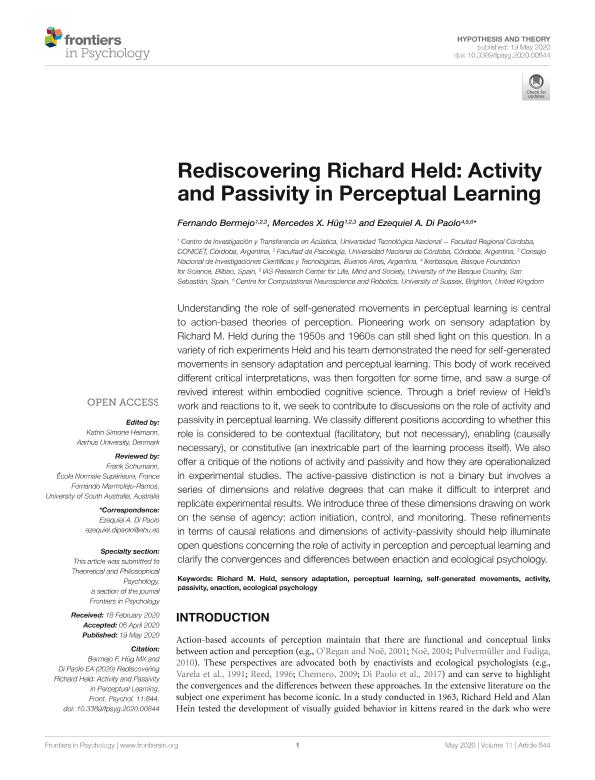Artículo
Rediscovering Richard Held: Activity and Passivity in Perceptual Learning
Fecha de publicación:
19/05/2020
Editorial:
Frontiers Media
Revista:
Frontiers in Psychology
e-ISSN:
1664-1078
Idioma:
Inglés
Tipo de recurso:
Artículo publicado
Clasificación temática:
Resumen
Understanding the role of self-generated movements in perceptual learning is central to action-based theories of perception. Pioneering work on sensory adaptation by Richard M. Held during the 1950s and 1960s can still shed light on this question. In a variety of rich experiments Held and his team demonstrated the need for self-generated movements in sensory adaptation and perceptual learning. This body of work received different critical interpretations, was then forgotten for some time, and saw a surge of revived interest within embodied cognitive science. Through a brief review of Held’s work and reactions to it, we seek to contribute to discussions on the role of activity and passivity in perceptual learning. We classify different positions according to whether this role is considered to be contextual (facilitatory, but not necessary), enabling (causally necessary), or constitutive (an inextricable part of the learning process itself). We also offer a critique of the notions of activity and passivity and how they are operationalized in experimental studies. The active-passive distinction is not a binary but involves a series of dimensions and relative degrees that can make it difficult to interpret and replicate experimental results. We introduce three of these dimensions drawing on work on the sense of agency: action initiation, control, and monitoring. These refinements in terms of causal relations and dimensions of activity-passivity should help illuminate open questions concerning the role of activity in perception and perceptual learning and clarify the convergences and differences between enaction and ecological psychology.
Archivos asociados
Licencia
Identificadores
Colecciones
Articulos(CCT - CORDOBA)
Articulos de CTRO.CIENTIFICO TECNOL.CONICET - CORDOBA
Articulos de CTRO.CIENTIFICO TECNOL.CONICET - CORDOBA
Citación
Bermejo, Fernando Raul; Hug, Mercedes Ximena; Di Paolo, Ezequiel Alejandro; Rediscovering Richard Held: Activity and Passivity in Perceptual Learning; Frontiers Media; Frontiers in Psychology; 11; 19-5-2020; 1-14
Compartir
Altmétricas




